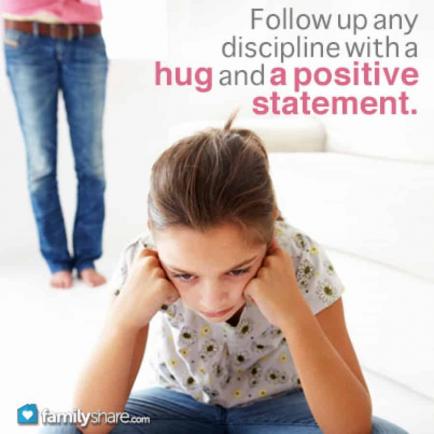
We've all heard the phrase, "an eye for an eye and a tooth for a tooth." Before we use it as a guideline for giving our children consequences, we should ask ourselves, am I teaching or am I doling out punishment?
Ultimately, we want our children to do the right thing because it is the right thing to do and a way to secure their happiness. What we don't want is for them to do the right thing because they are terrified of doing the wrong thing.
There are ways to be more creative and apropos when it comes to allowing your children to suffer the consequences of their actions. Here are 12:
1. Diversion
Sometimes when tempers are flaring, what is most effective is a little diversion. Try giving the child a mindless task like stringing beads on a piece of yarn or working a puzzle. This gives them a quiet, centering time out.
2. A literal "grounding"
Try literally "grounding" them - work side by side in the yard on a project: planting flowers, pulling weeds, shoveling snow, etc. Nothing takes the wind out of their sails like good hard work.
3. Your "help"
When nothing you've done has resulted in them cleaning their bedroom, cheerfully offer to do it yourself—with garbage bags. Bag everything up in large lawn bags without the discrimination of sorting. Then allow them one bag at a time to "unpack."
4. For sibling squabbles
Who's going first on the video game or who gets to borrow the car or play with a particular toy? For these squabbles, keep a small bag handy with personal questions such as, "What's your favorite color?" or "What three things would you take if you knew you were going to be stranded on an island?" Randomly select a question from the bag. Have each guilty party write their own answer and the answer they believe the other guilty party(s) would give. Whoever answers correctly (the one that knows the other the best), wins the challenge.
5. RHIP
For bickering about who gets to ride in the front seat of the car (assuming they are old enough to ride in the front seat), use the RHIP (Rank Has Its Privilege) rule. Oldest always gets the front seat.
6. The tried-and-true essay
Writing is a great way for children to express things they might not be able to speak. Use essay writing as a consequence and have them include the following: why they did what they did ("What were you thinking?"), how they might keep themselves from doing it in the future, and what a thoughtful punishment might be. Avoid putting a minimum number of words on it - what you'll get back is enough adjectives and adverbs and to make you both miss the point.
7. Out-kid your kid
If you have a whiner, try something more creative than, "If I hear one more complaint out of you, I'll ..." Instead, play a game of one-up-man-ship. I completely broke this habit in my little whiner this way. The conversation got to such a ridiculous state that we both broke out in giggles.
Kid: "I'm bored."
Me: "I'm bored and my feet hurt."
Kid: "I'm bored and my feet hurt and the sun is in my eyes."
Me: "I'm bored and my feet hurt and the sun is in my eyes and I have a brain tumor."
8. Contracts
If your children are older, try contracts. Together, come up with lists of actions and appropriate consequences. Then put them in writing and have all parties sign and date them. This way there is no question what will happen should the contract be breached.
9. Trade with the victim
If one child is tormenting another, let them do one of the victim's chores.
10. "Remove" the problem
If a child is disrupting mealtime, invite them to eat their meal in another location.
11. Benefit of the doubt
Using the benefit of the doubt can be effective. If you suspect they are lying, tell them, "I believe you because I know you would never lie to me."� I have generally received tearful, full Technicolor confessions within 20 minutes.
12. Love in the end
Follow up any discipline with a hug and a positive statement.
Using a little imagination will make for more effective discipline.

